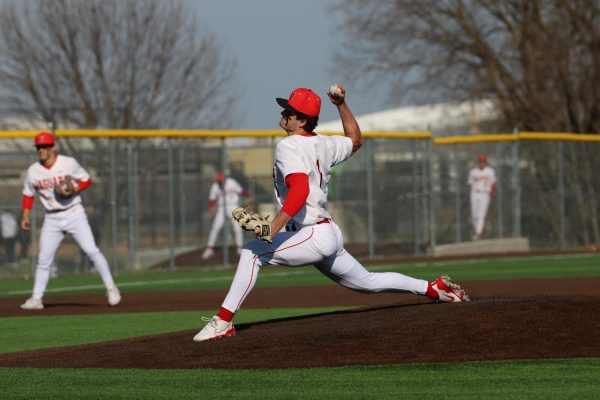Allegations of Sexism Divide Debate Community
Team members clash over group message arguments, evidence sharing and whether female debaters are devalued
June 20, 2017
Debate is a cornerstone of pride at BV West with impressive accolades and a reputation for excellence. The team, led by coach Arianne Fortune, includes an eclectic collection of some of the brightest minds in the school. It is hard to imagine that the team struggles to define “sexism” as a group.
Yet, they do.
Some female members of the team see sexism in almost every aspect of debate: from sexist arguments that are made in a group message, to the practice of separating debate evidence, to more overt examples of sexual harassment.
“Debate is a festering petri dish of horrible things,” said a female debater. “Personally, I don’t really feel comfortable on the debate team.”
Female debaters who spoke to Spotlight feel these problems are extensive and dangerous to the team.
“It’s about seeing certain members of a team as more valuable than others, and when that happens, you don’t consider the people who have legitimate complaints,” said another female debater. “You don’t consider their problems as problems. But yes, they’re happening, and yes, they’re problems, and yes, people could be getting in big trouble for what’s happening.”
The Assistant
An incident of sexual harassment by two male debaters occurred at an out-of-town tournament in 2015.
According to 2016 alumni Bijan Esfandiary, an underclassman male debater sent a direct message on Twitter to a female debater from another school he was later debating against. The message proposed that she send nude photos of herself and he would, in exchange, concede the debate round to her.
According to Esfandiary, he gave the underclassman the idea to send the message. Esfandiary said that he proposed the idea in a joking manner, but the idea was taken seriously by the underclassman who then made the request.
The Spotlight confirmed that the female debater receiving the message was a minor at the time of the message. Her debate coach reported the incident to Fortune.
Fortune brought the situation to the attention of BV West’s assistant principal Bryan Brutto. According to Esfandiary, Fortune and Brutto believed that the underclassman was the sole perpetrator.
Esfandiary reported that, in order to deflect some of the blame from the underclassman, he told Brutto that he was actually serious when he proposed sending the message.
Esfandiary stated that both he and the underclassman were required to write apology letters to the female debater and serve detentions. The underclassman was also not allowed to debate in one debate tournament, according to the underclassman.
“He [the underclassman] automatically regretted it, so obviously he was just joking; he wasn’t actually being serious about it,” junior Dan Vasudevan said. “But I guess there is no excuse for saying stuff like that.”
Fortune believes that Esfandiary deflected some of the blame in order to be a team player.
“He [Esfandiary] took the fall for another student on that deal because he was afraid that it would be a worse ramification for that kid than it was for him,” Fortune said. “Bijan took the blame because he is a unifying factor on our team.”
Esfandiary is now the assistant coach of the debate team. The debater that sent the message remains on the team.
“Our coaches are in charge of identifying individuals who would be assistant coaches,” said principal Dr. Brett Potts. “In the case of debate, Fortune would be in charge of getting that [individual]. That [hiring] would require administrative approval, so likely the person who approves that would be the assistant principal, which would be Mr. Brutto.”
According to a female debater, the solicitation of nude photos goes beyond a simple joke and continues to impact gender relations of the team.
“They were valuing her nudes over winning the round,” a female debater said. “They were saying, ‘I’d rather see your nudes than win the round and debate you as an equal.’”
The Dropbox
An exclusive Dropbox account further causes divisions among the team. According to Vasudevan, only six male debaters have access to this collection of research and argumentations that are used in tournaments.
Debaters gather evidence, or “cut cards,” to back up what they say in tournaments. Normally, they put the gathered evidence into one of the official debate Dropboxes that the entire team can use. An advantage of having a large team means that the research burden is lower while the research available is greater.
Although the debate team’s policy is to have Dropboxes for younger and older debaters, a third, exclusive Dropbox exists for a few male debaters. Girl varsity debaters have asked for access and are willing to contribute, but have been denied by male members.
“They [a few male debaters] would cut cards and put them onto their own flash drive or onto a different Dropbox because they did the work so they’re going to take the credit,” said junior Matthew Burgess. “They would create this massive Dropbox full of cards that they didn’t share.”
Vasudevan, who has access to the exclusive Dropbox, feels that evidence should not have to be shared with other members of the team, because the six males who have access worked harder than the girls.
“The main point of argument is that the females don’t feel like we are giving them our help or our debate research files, but then again the thing is we kind of make those files and we do it ourselves,” Vasudevan said. “If they come and ask for help, we obviously don’t give up all of our files because we don’t want them sharing them with people from different schools, but we always tend to give them advice and kind of help.”
Female members of the debate team take issue with the assumption that they do not work hard and believe that the practice of an exclusive Dropbox not only hurts their results, but the results and atmosphere of the whole team.
“How do you foster an environment of cooperation when you are telling some people that you don’t need to be sharing your work?” a female debater said. “You are automatically alienating people from the squad when you do that, and you are creating your own little clique, and that’s not receptive to doing well in debate.”
Some of the female debaters interviewed felt strongly about being excluded from the Dropbox and went to Fortune for help. Multiple females compete on the top level Debate Coaches Invitational, DCI, circuit that the boys using the exclusive Dropbox are on. In some cases, the females have been on the team longer.
“I don’t think that if a young lady came to practice, contributed and wanted to be at that level and was practicing at that level and working at that level, I don’t think that they would exclude her,” said Fortune. “I wouldn’t allow them to.”
Fortune is aware of the exclusive Dropbox and does not feel that it is wrong to exclude the top female debaters from accessing the information.
“I am okay with them having a private Dropbox of their own because I understand their commitment level and what they’re trying to get out of that,” said Fortune. “There’s really four different levels of debate, so it’s okay for me if that very top level needs to have its own Dropbox.”
Fortune’s comments contradict the opinion of the senior female debaters who have the understanding that they travel and compete at the highest level. None of them have access to the exclusive Dropbox while sophomore boys are included.
The Group Message
Another point of conflict between the male and female debaters involves arguments that occur in a debate group message on GroupMe. There are approximately 14 male and female debaters in the group message at any time.
According to a female debater, many of the disagreements in the group message devolve from politics into sexism when the males “mansplain,” and also make fun of females who get upset.Male members using derogatory terms like “bitch,” or worse, while discounting the intelligence of the females, results in female members feeling disrespected.
“In the past, a lot of it was them [some male members] demanding information [regarding arguments], but when we gave them what they wanted, they would immediately jump on it and question it,” a female debater said. “But as soon as a guy would agree with what I was saying, they [certain males] would act like the words were gospel.”
Some male debaters believe that while some of the arguments in the group message “get out of hand,” the confrontations are not started with the intention of being sexist.
“The thing is that the guys in the GM [group message], I don’t necessarily think that they’re making the arguments that they are with the intentions of being sexist,” said Vasudevan. “I think they are just trying to prove one thing or another.”
The girls’ concerns resulted in discussions in the group message, among team members regarding whether or not the arguments in the group message were sexist. Because of those talks, some male debaters believe that the overall toxicity of the group message is decreasing.
“We have had pretty nice discussions about what we should do to reduce the toxic nature of how things go down in there [group message],” junior Srivats Narayanan said. “It’s definitely in an upward trend.”
Female debaters do not agree that the conversations in the group message are improving nor has the behavior of the male debaters.
“When you do something wrong, you don’t just have to acknowledge it and say sorry,” a female debater said. “You have to not repeat the same kind of behavior again.”
Based on discussions, Burgess, who is on the team but not in the group message, generally shares the opinion with the female debaters that the conversations within the group message are harmful.
“It [the group message] is generally used to be mean,” Burgess said. “I think it’s used as a tool to bully people who they [certain male debaters] think are lesser or don’t deserve the attention that they get.”
Female debaters feel that sexism, harassment and criminal behavior goes unnoticed in debate because the perpetrators are successful debaters.
“A lot of people wouldn’t go against the idea, that if we have debaters that are really good, we should let them get away with what they’re doing because they’re the ones that are winning all of these tournaments,” a female debater said.
Fortune believes that complaints of sexism are coming from certain female debate team members who have negative attitudes.
“This ax to grind is coming from people that are toxic to a certain extent,” Fortune said. “They’re negative and other people pick up on that. Just because people that are disgruntled make a statement doesn’t necessarily mean that that’s the truth.”
Fortune also believes that complaints of sexism stem from a lack of understanding of the word “sexism.”
“I think the disconnect might be in the misunderstanding in what that word actually means,” Fortune said. “True sexism would be if I were to say ‘okay you girls could only debate at this level. These other levels aren’t open to you.’’’
According to Fortune, if people would interact more with the top debaters, many of the complaints of sexism would resolve. Yet the female debaters interviewed by Spotlight and “top debaters” travel the same DCI circuit.
“I think if people take the time to get to know people and get to know their true motivations without casting aspersions, or just making assumptions about ‘oh this person is that way’ or whatever, I think that they would be pleasantly surprised by the level of compassion and empathy and character that so many of our top debaters have,” Fortune said.
The female debaters believe labeling them as women who have an “ax to grind” is grossly unfair.
“Wanting to be treated equally and fairly doesn’t make me a girl with a vendetta, or an ax to grind, it makes me within my rights as a human being who deserves respect and justice,” a female debater said.
The female debaters feel that they, and their complaints, are dismissed as non-issues. They have approached Fortune about the lack of access to the private Dropbox. Their complaints have not led to change.
































C. B. • Feb 27, 2022 at 9:33 pm
Came here from a google result after seeing the “Debate Like A Girl” POI program from a video online. This is HORRIFYING. If Fortune was my coach, and this as my team, I’d lodge a formal complaint and then quit. These girls are so strong and resilient. Everyone else here sounds like terrible people.
Sierra Menzies • Nov 8, 2017 at 9:12 pm
Thank you for publishing this. I am a 2014 alum and the same things were happening when I was on the team. I was brought to tears of rage reading this and felt such sadness remembering what happened to me. The men on my team literally called themselves/were called “The Trolls” and took pride in being menaces. My sister will be a freshman next year and I cannot in good faith recommend that she join the debate team knowing the kinds of things that are happening. Please let me know if I can provide any testimonies to further bring light to the past goings on of the BVW debate time.